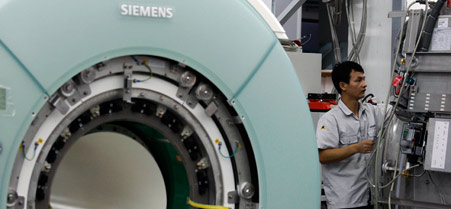Defense investigators raid health imaging contractor's offices
Search could be related to a lawsuit filed by a former employee alleging misrepresentation of discounts to commercial customers.
 Siemens offered better discounts for medical scanning equipment to commercial customers than it did for federal customers, according to court documents.
Siemens offered better discounts for medical scanning equipment to commercial customers than it did for federal customers, according to court documents.
A Defense Department investigative team searched the offices of a health imaging company on Thursday that last month won a $267 million contract to supply the department with radiology systems and components.
The raid of Siemens Medical Solutions USA could be related to a federal suit filed in January that alleges the company "habitually lied" about discounts it offered federal customers.
Gary Comerford, a spokesman for the Defense Criminal Investigative Service, confirmed that a search warrant was executed for the Siemens Medical offices in Malvern, Pa., but declined to provide details. Lance Longwell, a spokesman for Siemens Medical, said the search was in connection with an investigation of a Siemens-Defense contract.
William Thomas, who served as a senior national accounts manager at Siemens Medical from 2004 to 2007, alleged in a lawsuit filed on Jan. 29 in the U.S. District Court for the Virgin Islands that Siemens disregarded the best value requirements in federal contracts for a range of medical imaging equipment and offered commercial customers deeper discounts than it gave federal customers, including Defense, the Veterans Affairs Department and the Bureau of Prisons.
In its bids for contracts with federal customers, "Siemens habitually lied in pricing disclosure forms in order to conceal the more competitive pricing it offered to its private customers," Thomas said in his suit.
Contractors are required to offer their best prices to the federal government. Federal solicitations contain discount pricing and disclosure forms to verify the best value.
Siemens misrepresented the discounts it provided commercial customers in the contract , a decision that constituted a "false statement to the government," the lawsuit claimed. For example, Siemens cut prices on analog radiology equipment 74 percent to commercial customers in 2005, but it offered an average of 30 percent to federal customers, Thomas alleged. Siemens discounted prices on computed tomography scanners of up to 74 percent, but offered federal customers a reduction of 32 percent.
To minimize the discount to the government and maximize its profits, the Thomas lawsuit alleged Siemens "falsely represented" on government contract forms that it didn't offer better discounts to its commercial customers. Company officials simply checked the "No" box on questions about whether they provided better discounts than those offered to the government, according to the lawsuit.
Had the government known true pricing information during the bidding process, "it would have been able to negotiate considerable better discounts," the lawsuit said. "Siemens's continued misrepresentations and concealment have defrauded the government of millions of dollars."
Thomas filed his suit under the False Claims Act , which permits individuals not affiliated with the government to file actions against federal contractors claiming fraud against the government. He seeks a civil penalty for each instance of fraud, but total penalties were not detailed in court documents.
Thomas, now associate director at the Southwest Church Planting Network of the Presbyterian Church in America in Dallas, an organization that backs the construction of new churches, did not return a call for comment. Longwell said Siemens said they do not comment on ongoing litigation.
NEXT STORY: A Galaxy of Cyber Four Stars?






